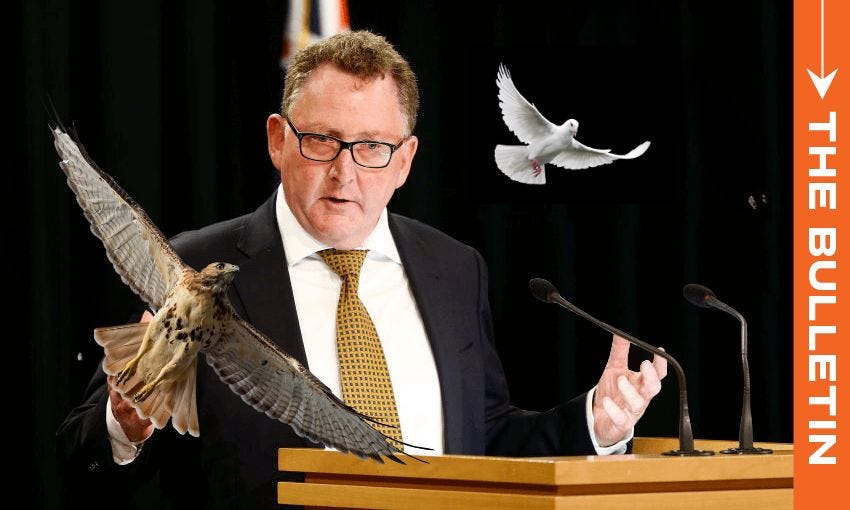Is a hawkish stance enough or will the Reserve Bank strike with a hike?
Billed as one of more consequential OCR decisions in a while, tomorrow's call is set against a backdrop of rising mortgage costs and mortgage anxiety
Mōrena, and welcome to The Bulletin for Tuesday, February 27, written by Anna Rawhiti-Connell.
In today’s edition: Government launches inquiry into school property ‘crisis’; third-party groups spend 13 times what they spent in 2020 in run-up to 2023 election; briefings reveal officials urged the associate health minister to retain parts of smokefree laws; but first, why all eyes are back on the Reserve Bank
Why all eyes are back on the Reserve Bank
It was only eight months ago that I ran a photoshopped picture of a hawk flying away and a dove coming in to perch on Reserve Bank (RBNZ) governor Adrian Orr’s arm. Apologies to all for the lazy and shoddy reverse today. Sometimes I wonder if Orr is looking forward to the day when people aren’t photoshopping birds into photos with him or, as interest.co.nz have done, turning him into a mythological creature called an OrrHawk. That link is worth a click (and not just to see an OrrHawk). David Hargreaves has penned a clear analysis of why all eyes are on tomorrow’s official cash rate (OCR) announcement and the case for and against an OCR rise. For the first time in a while, there’s uncertainty about the call against a backdrop of mixed economic data. Keeping in mind most of them lag, some indicators point to an economic slowdown and unrelenting cost pressures and anxiety. Others, like the latest domestic inflation figures, show a slower-than-preferred path for getting inflation back within the 1-3% range.
Huffed and puffed but will they blow the house down?
The RBNZ has held the rate steady at 5.5% since May last year. The assumed track between then and last November was that it start heading downwards, with various punts on when the OCR, and subsequently home loan interest rates, would fall. As Stuff’s Susan Edmunds explains in a good “how we got back here again” piece, the bank’s last update in November marked a shift in tone, leaving the door open to further rate rises in the event of nasty surprises (worsening economic data). That arrived in December with weaker-than-expected GDP data. That was followed by inflation data that highlighted domestic inflation was still proving sticky, and then unemployment data. Acknowledging that any rise in the unemployment rate means real people without work, the rate has lifted somewhat but is still considered low. ANZ economists threw a cat amongst already startled doves on February 9 with their prediction that the bank may yet push two more OCR hikes. ANZ remain lone wolves in that call, with Kiwibank economists picking up another wolf analogy yesterday in their latest update. Headlined, “But RBNZ, what great teeth you have”… “The better to threaten rate hikes with”. Kiwibank economists don’t think the RBNZ will hike, saying they’ve huffed and puffed and will probably continue doing so but won’t blow the house down.
Biggest single-year increase in size of average mortgage payments since 2008
StatsNZ figures released last week show that for the year ending June 2023, average mortgage payments increased 27.5%. Average weekly expenditure on mortgage payments was $605.60, compared with $475.00 in the previous year. In the latest RBNZ household expectations survey, the number of people saying they could miss a mortgage payment in the next three months increased from 12.4% to 17.3%. In November last year, it was estimated about two-thirds of mortgages fixed at low pandemic-era rates have now rolled over to pricier loans. As interest.co.nz’s Dan Brunskill reports, retail sales volumes have been falling for eight consecutive quarters and dropped another 1.9% in the last quarter of 2024. BNZ’s Doug Steel said the data showed New Zealand’s jets have not only been cooled but are now in reverse.
Rate rises and more cost increases
Politically, further rises to the OCR will be a real spoke in the wheel for a government that campaigned on bringing down the cost of living and getting us back on track. In an update for subscribers to
yesterday, Hickey pulled no punches, saying the government’s “actions and inactions in its first 100 days have made domestic inflationary pressures worse, raising the risk the RBNZ is forced to hike on Wednesday to offset those pressures.” Hickey zeroes in on signalled price rises by domestic monopolies like Air NZ and power companies and the government pushing back infrastructure costs to local councils, which will likely prompt rate hikes.Government launches inquiry into school property ‘crisis’
Yesterday, education minister Erica Stanford announced the government is launching an inquiry into what it says is an inheritance of a school property system “bordering on the crisis”. Stanford said, “Within weeks of forming a government, the Ministry of Education had already paused 20 building projects and informed me that there could be up to 350 projects in various stages, from design through to pre-construction, where expectations far exceeded what could be delivered.” Stanford spoke about this issue with RNZ’s Kathryn Ryan in early February. If you’re interested in the new minister’s views on the current state of education and specifically this issue, the interview is worth a listen.
Labour leader Chris Hipkins has pushed back calling the inquiry “a desperate attempt to create an excuse to cut much-needed school building projects”. Prime minister Christopher Luxon also pushed back on any comparisons to the previous government in the establishment of more inquiries and working groups. “What you saw in 2017 was a government come to power that had no ideas and no policy programme so they formed long working groups that went on forever, with broad terms of reference, 232-plus of them. What we're talking about here is short, sharp, surgical review teams where we've got a really big problem and we need to get to the bottom of it very very quickly”. As BusinessDesk’s Cécile Meier reports (paywalled) this morning, the Ministry of Education consulting bill has increased by 450% since 2019, with the biggest area of spending revolving around managing its $30b school property portfolio.
Largest third-party spender at election largely unknown
RNZ’s Farah Hancock has combed through figures released by the Electoral Commission to reveal who the biggest third-party spenders were at last year’s general election. Only groups that spend more than $100,000 are required to share their expenses. As Hancock reports, the groups spent 13 times the amount spent at the 2020 election. The largest spend was made by a group called Vote for Better, run by Tim Barry, a director of a bloodstock business and an advertising company. The group ran online ads, with a Reddit thread asking whether anyone else was getting that “godawful tiktok AI voice” in Vote for Better video ads on YouTube. The second biggest spender was the Taxpayers' Union, followed by the Council of Trade Unions.
In another story about election spending, Newsroom’s Jonathan Milne reports that mining firm Bathurst Resources donated $32,600 to 29-year-old independent Patrick Phelps’s campaign in the West Coast seat. As Milne reports, Phelps is manager of Minerals West Coast Trust, a Hokitika-based industry association funded by mining companies to the tune of $220,000 last year, and chaired by Bathurst’s Richard Tacon. National’s Maureen Pugh eventually won the seat, taking it off Labour’s Damien O’Connor but the number of votes won by Phelps looks to have had quite an impact on the result.
Give support, get great journalism
Since the start of the year, Spinoff readers have helped fund some of our most popular and important work including our newly launched editorial series The War for Wellington, coverage of Waitangi Day, te Tiriti explainers, an investigation into the rise and fall of a popular Auckland restaurant, fresh episodes of Gone by Lunchtime and more.
Whether you read, listen to or watch our mahi, you can support us to do more by donating today or signing up to become a Spinoff member.
Click and Collect
Briefings reveal officials urged the associate health minister to retain parts of smokefree laws. The repeal of those laws is set to happen under urgency this week.
Police are laying a fourth charge against former Green MP Golriz Ghahraman
An expert estimate on how much a Taylor Swift tour could have generated for the New Zealand economy.
Tired: complaining about bus replacements in Wellington on weekends and public holidays for the next 10-15 years. Wired: Do a few things on this list over the next 15 years while you’re not catching a train on the weekends in Wellington. Failing that, there’s a new campaign from Wellington City Council encouraging people to stop grumbling.
Feeling clever? Click here to play 1Q, Aotearoa’s newest, shortest daily quiz.
Police recently proposed a ‘managed withdrawal’ from family harm callouts. As Eda Tang reports, one critic says it’s tantamount to decriminalising family violence. Shanti Mathias explores the trial scheme to welcome more refugees to New Zealand. Jonathan Manns argues that Wellington's Town Belt is a weird quirk of the past that could be the key to the city’s future. Madeleine Holden finds out what it's like to be a zookeeper. Alex Casey rounds up what's worth watching on Netflix, Neon and more this week.
Sporting snippets
The Black Ferns Sevens team are Vancouver Champions for the second year running. The tournament is one of the ten stops on the World Rugby Sevens Series.
More technological wizardry for Super Rugby. Two players from the Chiefs were mic’d up on the field on Friday in a bid “to bring fans even closer to the action”.
Got some feedback about The Bulletin, or anything in the news? Get in touch with me at thebulletin@thespinoff.co.nz.
If you liked what you read today, share The Bulletin with friends, family and colleagues.










